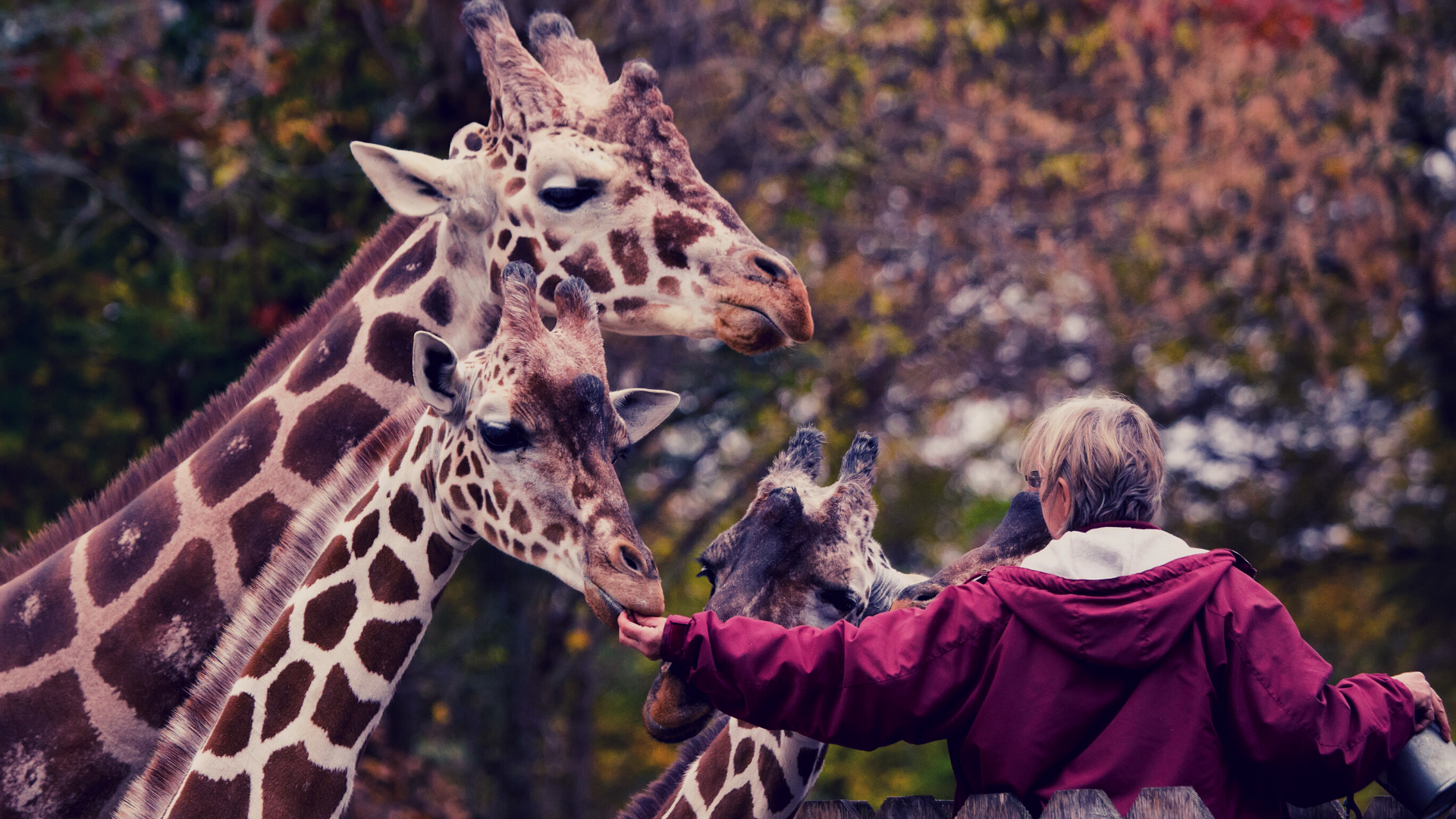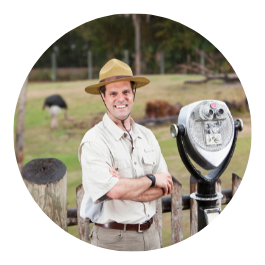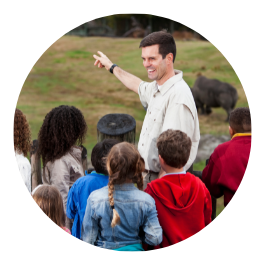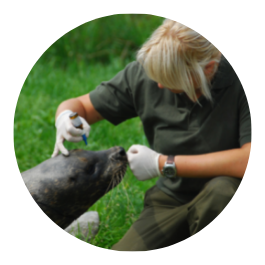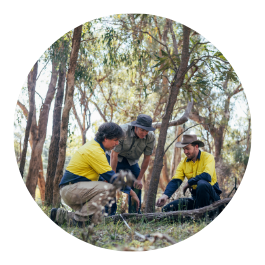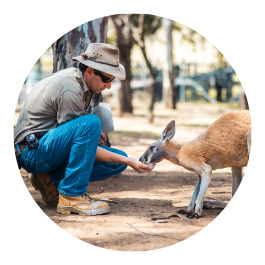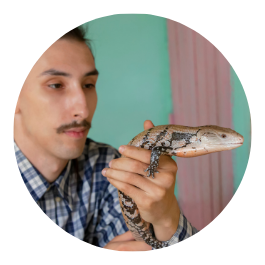Find Your Perfect School
Did you know that the first known zoo was at Hierakonpolis? It was in Upper Egypt’s capital and was located south of Luxor and along the Nile River.
The zoo seemed to have held wildcats and monkeys. But if you’re looking for the oldest zoo still in operation, your best bet is halfway around the world over at Tiergarten Schönbrunn in Vienna, Austria!
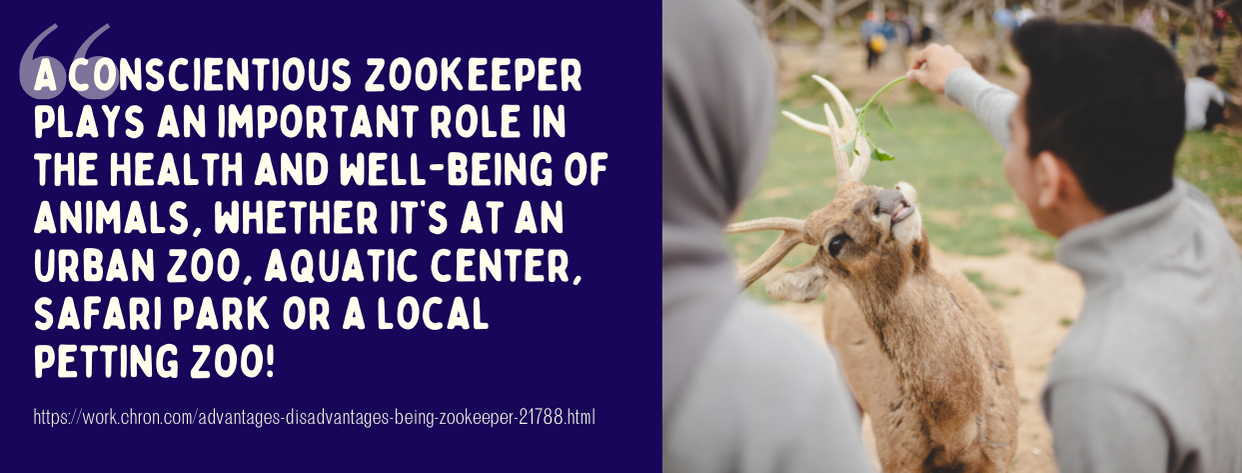
You may find it fascinating to see the world’s largest zoos at the Smithsonian Conservation Biology Institute, the Sri Venkateswara Zoological Park, and the Living Desert Zoo and Gardens.
Many of these zoos may be among your dream workplaces when you’re considering earning a Bachelor’s in Zoo Science degree to become an animal keeper or a zookeeper! Either way, the possibilities are endless!
Quick Summarization:
Animal Science is a very important aspect of becoming an Animal Keeper. Most positions require a Bachelor of Zoo Science or Animal Science college degree to excel in the field. Earning a bachelor’s degree in a Zoo Science program is fun and exciting for animal lovers!
“Jump to” the School of your Choice:
Michigan State University
Saint Francis University
Delaware Valley University
Friends University
West Liberty University
Otterbein University
Malone University
Liberty University
Drake University
What Animal Keepers Do
Why are zoos such attractive places to work in? Aside from the well-paying jobs and the excitement, challenge, and rewards of working with animals, zoos are important for many reasons.
These include the conservation of animals, many of which are endangered; the education of the general population about wild animals and their place on the planet; and the ongoing research on their habitats, relationships, and impact. Through animal science, students learn how to administer care and conserve wildlife, as well.
Just imagine the impact that you, too, can make on animals in particular and on society in general if you become part of the zoo operations! Of course, there’s a wide variety of jobs at zoos and similar places, from directors and coordinators to veterinarians and animal keepers.
Want to be an animal keeper? The actual tasks vary depending on the workplace and specific job title, but these include:
- Give food and water to the animals in your care
- Clean their living spaces and equipment
- Examine them for signs of stress, injury, and illness
- Groom animals including giving them baths, trimming their nails, and clipping their hair
- Monitor their health, behavior, and progress, and keep records for future reference
- Facilitate their exercise periods
- Train them (obedience or behavior training)
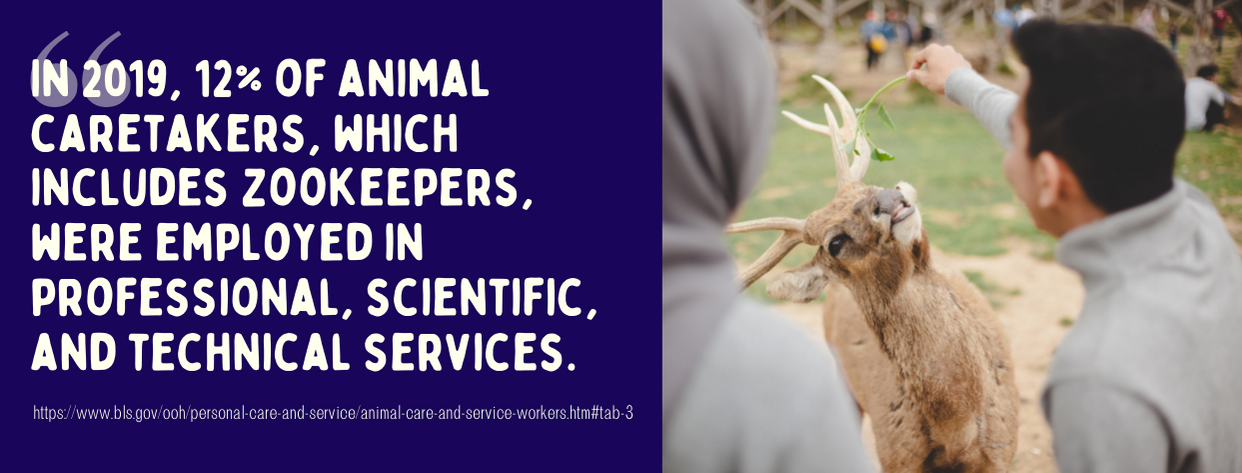
Some tasks may not apply to certain animals, particularly in zoo settings, so it’s important to know the limitations.
METHODOLOGY
In the following section, basic information about the Bachelor’s in Zoo Science degree programs is discussed. Keep in mind that only related degrees, such as zoo and wildlife biology, have been included in the list. Thus, degrees in zoology and animal science are excluded since these are different areas of study.
These ten programs were chosen based on the following criteria:
- Accreditation from a regional accreditation agency is always a must when choosing a bachelor’s degree program. This is proof that the school and program meet quality education standards, including curriculum, faculty, and facilities.
- Engagement refers to the manner and level of participation between students and faculty, peer-to-peer interactions, and external interactions. Students learn through multiple channels, including classroom lectures, discussions, and hands-on experiences.
- Faculty credentials and training must meet, even exceed quality standards. Schools with faculty members possessing master’s and doctoral degrees are more likely to provide quality education.
- Facilities, services, and technologies must support the academic goals and standards of both the school and the students. These can include state-of-the-art classrooms and laboratories, accessible and updated library resources, and partnerships with external organizations.
These programs are also well-regarded for their above-par graduate outcomes! Reputation and reliability are equally important to the university.
To learn more about our selection process, see our Methodology page!
Top 10 Bachelor’s in Zoo Science Degree Programs
Michigan State University
BS in Zoology with a Concentration in Zoology Science
Natural Science Building, 288 Farm Lane, Rm. 203, East Lansing, MI 48824
(517) 355-4640
MSU implements an interdisciplinary approach to its zoo and aquarium science program and, thus, enables students to appreciate its multifaceted nature. Students learn through rigorous academic coursework, expert lectures, and hands-on experiences that develop their workplace-appropriate skills.
The academic coursework consists of general education courses and core courses in genetics, comparative anatomy, and animal behavior. Classes and seminars with a specific focus on zoo and aquarium science are also part of the coursework. Every class and seminar builds on prior knowledge and, thus, strengthens their skills.
Lecturers from zoos and aquariums accredited by the Association of Zoos & Aquariums (AZA) share their knowledge. The lectures cover an extensive range of topics from zoo ethics to zoo animal nutrition, husbandry, and disease management. These are conducted with a practical approach that complements the more academic nature of classroom sessions.
Take note that zoo and aquarium science is just one of many concentrations within the BS in Zoology program. The other concentrations are general zoology, animal behavior, neurobiology, evolution, and organismal biology.
Students complete a semester-long internship at their choice of zoo or aquarium, either during their junior or senior year. These are akin to on-the-job training, where students learn the ropes of day-to-day operations while being supervised by staff members. Their experience may also include interacting with visitors, assisting in animal care, and contributing to efficient operations.
While the academic coursework establishes the foundational knowledge, the internship develops the soft skills of students. These include communication, critical thinking, and problem-solving skills, which are essential in overcoming the job’s daily challenges. Animals, after all, are unpredictable creatures, and interpersonal relations in the workplace must be handled with professionalism.
Graduates of MSU’s exceptional program find employment within a short time after completion, too. Popular workplaces include zoos and aquariums across the country, and their exciting jobs include zookeepers, zoo curators, and researchers. Many have also found gainful employment in businesses and government agencies.
Saint Francis University
BA in Aquarium and Zoo Science
117 Evergreen Drive, PO Box 600, Loretto, PA 15940
(814) 472-3000
As a private Catholic liberal arts university, Saint Francis University doesn’t think of academics as pure academics. Instead, its educational approach combines liberal arts traditions with a contemporary science-based curriculum. Both students and alumni then benefit from the well-rounded education designed to spur their drive for excellence.
This is true for its BA in Aquarium and Zoo Science program designed for individuals interested in working at zoos, aquariums, and natural reserves. There’s an emphasis on a liberal arts education and science-backed coursework in biology, animal behavior, and animal husbandry. The liberal arts courses include psychology of learning, psychology, and English communication, vital in the workplace.
Students gain the foundational knowledge and skills to make them productive workers in whatever workplace they find themselves in. The university designed the program according to the current hiring needs of zoos, aquariums, and nature reserves, so there’s no academe-industry gap. This means graduates are prepared for the challenges of the workplace and require little to no supervision.
The average completion time is four years of full-time study, including the internship and capstone requirements. Students in the 128-credit program start their journey with broad biology coursework as freshmen. Then in succeeding years, their intensive studies will cover topics on animal care and nutrition, microbiology, marine biology, and vertebrate and invertebrate zoology.
Students also develop their presentation skills in the classroom and in future workplaces where school children, visitors, and staff watch and listen. These are useful skills in advocacy groups where presentations are a common part of a holistic strategy to educate the general public.
There’s a capstone requirement – the Evolution course – and a 6-credit internship requirement. Each internship credit is equivalent to 40 hours of work, typically done during the summer term.
Small class sizes allow for close mentor relationships. Students are encouraged to share their gifts by adopting an attitude of service, a trait espoused by Saint Francis.
Delaware Valley University
BS in Zoo Science
700 E. Butler Ave., Doylestown, PA 18901
(215) 345-1500
DelVal’s zoo science project is one of the best in the country because of the opportunities for students to gain hands-on, real-world experience. Aside from its 1,000-acre living classroom, it also maintains strong partnerships with these institutions:
- Elmwood Park Zoo
- Philadelphia Zoo
- Lehigh Valley Zoo
- Philadelphia Academy of Natural Sciences
- New Jersey’s Adventure Aquarium
The 1,000-acre living classroom is where students apply their academic coursework in an outdoor setting. There are also two science labs dedicated to studying small animals, and students can also observe the residential Allegheny woodrats colony. Indeed, every possible hands-on experience will be provided to students!
Students also complete their public education internship and animal care internship in one of the partner institutions. Here, the staff members ensure that the student-interns gain the practical skillset necessary for entry-level zoo professionals. The training can be challenging because student interns are expected to keep up with the staff members!
The core courses include Wild Animals in Captivity, Animal Training and Enrichment, Zoo Record-Keeping Systems, and Animal Behavior. There are also comprehensive classes in Mammalogy, Ornithology, and Herpetology, which means students get a well-rounded, relevant education. The small class sizes – about 13:1 student-to-faculty ratio – make learning even more conducive.
Friends University
BS in Zoo Science
2100 W. University Ave., Wichita, KS 67213
(316) 295-5000
A journey filled with adventure! Students at Friends’ BS in Zoo Science program are encouraged to see it in this manner to make it a great ride. Indeed, the overall experience can be described as an adventure into the exciting world of caring for wild animals in captivity.
The 128-credit program includes a comprehensive curriculum with subjects on:
- Zoo Science
- Management of Zoo Birds
- Management of Zoo Reptiles/Amphibians
- Management of Zoo Mammals
Conservation practices, animal husbandry and nutrition, and practical zookeeping techniques are also in the program of study. Traditional classroom work is as challenging as it is rewarding, thanks to engaging lectures and discussions. Students and faculty can develop effective mentor relationships, too.
Friends University also has a strong partnership with the Sedgwick County Zoo. As a result, students learn practical skills related to day-to-day zoo operations, from caring for the animals to giving public presentations. The practicum experience is also marked by hands-on experience in the nitty-gritty details of exhibit maintenance, animal enrichment, and animal husbandry.
The combo of robust foundational knowledge and hands-on experience means students are ready for the challenges that lie ahead! Alumni are known to be hired within six months after graduation in various workplaces, including zoos, aquariums, and animal shelters.
Students thrive at Friends University because of its extensive student support services. Access to the library and other academic support services is a guarantee. Classrooms are designed for interactive discussions and collaborative instruction, in which the experienced faculty members excel.
Your career can start even before you graduate, too! You can take advantage of networking opportunities during your practicum, for example, and get a job soon. Check out the career services offered by the university to fast-track your career.
What better way to earn a BS in Zoo Science than to attend Friends University? Check them out!
University of West Florida
BS Interdisciplinary Sciences – Zoo Science
11000 University Pkwy, Pensacola, FL 32514
(850) 474-2000
The Zoo Science program is only open to applicants with an Associate of Science in Zoo Animal Technology from Santa Fe College. This is due to the university’s cooperative degree completion program with the Gainesville-based public college. The associate degree program is excellent preparation for the bachelor’s degree program, thanks partly to the hands-on training gained at the Santa Fe College Teaching Zoo.
The Zoo Science concentration emphasizes the biological sciences that, in turn, prepare students for leadership positions in the industry. The extensive core coursework includes animal behavior, conservation biology, comparative animal physiology, genetics, and ecology. The electives include principles of evolution, marine vertebrate zoology, and avian science, which are just as crucial in a well-rounded zoo science education.
Becoming a successful professional isn’t just about academics either. Students then learn qualitative and quantitative research, statistical analysis, and soft skills. These include communication, analytical thinking, and problem-solving skills, which are vital in dealing with humans and animals in various work settings.
Upon graduation, you become qualified for entry-level positions, such as zookeeper or animal trainer. You may even open your own business with your skillset, but gain experience first, if possible.
Note that this isn’t a pre-veterinary medicine program.
West Liberty University
Zoo Science Major
College of Sciences, 208 University Drive, West Liberty, WV 26074
(304) 336-8149
WLU takes pride in its Zoo Science program for its affordable tuition, comprehensive curriculum delivered by experienced faculty, and hands-on experiences. Students learn in both the classroom and AZA-accredited zoos and aquariums, an academics and practicum combo designed for professional excellence. The real-world exposure occurs in exciting settings, including small and large zoos and aquariums, fish hatcheries, and wildlife rehabilitation centers.
Both the academics and practicum experiences are designed to develop foundational knowledge and practical skills vital for work success in these places. Knowing what to do during animal husbandry is crucial for dealing with supervisors, peers, and visitors!
WLU itself takes care of more than 225 animals that students can also learn from during their stay. If that wasn’t enough, students also enjoy internships in The Wilds and Oglebay’s Good Zoo, among others. The skills learned here will become valuable during employment in conservation facilities and other workplaces.
During their freshman and sophomore years, students must undergo these hands-on experiences:
- Volunteer at applied conservation and animal collection labs. This is a 200-hour minimum experience that must be completed every year.
- Become an intern for ten weeks at an AZA-accredited zoo.
During your junior and senior years, select two concentrations:
- Animal husbandry, which requires the completion of two semesters of internship
- Applied conservation has a two-practicum requirement, either with an approved conservation specialist or faculty.
Nobody said that earning a zoo science degree was easy, and it’s certainly not easy at WLU with its multiple volunteer and practicum requirements. But the rewards that come with the challenging curriculum are worth it! You have ample opportunities to land your dream job after graduation and become a leader with sufficient work experience.
Check out the Zoo Science Major at West Liberty University today!
Otterbein University
BA or B.S. in Zoo & Conservation Science
1 South Grove Street, Westerville, OH 43081
(614) 890-3000
Even more competitive is Otterbein University’s Zoo and Conservation Science program offered in BA and BS formats. Students must first gain admission as Pre-Zoo and Conservation majors and apply to the program after completing their freshman spring semester requirements.
Only 36 students will be admitted to the Zoo and Conservation Science program’s two tracks:
- 12 students for the Aquarium track
- 24 students for the Zoo track
The admission requirements include completing prerequisite courses with minimum grades, such as Bio 1010, Math 1250, and ZoSc 1010. Applicants must also have a 3.0 minimum cumulative GPA.
Students will be selected based on their overall academic record and non-academic requirements. The latter includes the ability to work in various weather conditions and on a flexible schedule. Animal handling experience and the like aren’t required for admission, but it can be considered a tie-breaker option.
Once admitted, students must still meet these exacting standards. Otherwise, they can risk incomplete or failing grades, even being disenrolled.
Students choose between the BA and BS programs based on their professional goals. With a BA degree, students can apply for employment in conservation biology, zoos and aquariums, consulting firms, and the government. With a BS degree, the work opportunities lean more toward graduate studies in zoo science, zoology, and biology, even veterinary science.
The differences in their curriculum include BS students taking one-semester classes in calculus and statistics and an extra upper-division biology elective. This means more challenging studies ahead! For students considering a different major or minor, the BA path is the better choice.
Otterbein also has long-standing partnerships with the Ohio Wildlife Center, Columbus Zoo and Aquarium, and the Reef Systems Coral Farm, where students enjoy hands-on training.
Through the training, students explore, in-depth – and with their hands getting dirty – animals and their health, habits, and husbandry. The daily challenges of working with animals mean better communication, critical thinking, and problem-solving skills.
First-year students first learn zoo science and its related aspects. Starting in their sophomore year, students engage in practicum experiences at the Ohio Wildlife Center. Their junior year’s highlights are the Columbus Zoo and Aquarium practicum and upper-division biology courses; the practicum can also be conducted in other venues. The senior year practicum involves undergraduate research, such as on coral reef ecology or zoo animal behavior.
Malone University
BA in Zoo and Wildlife Biology
2600 Cleveland Ave NW, Canton, OH 44709
(800) 521-1146
Individuals interested in working with animals should consider Malone’s BA in Zoo and Wildlife Biology program. The balance between theoretical coursework and applied experiences, including internships and research, is the best! Students learn to work with the knowledge they possess and use it for real-world situations.
Malone maintains robust professional relationships with the Cleveland Museum of Natural History, Beech Creek Botanical Gardens, Stark Parks, and Clover Field Wildlife Care. These partnerships allow its students to gain hands-on experience in workplace settings that will be valuable in the future. Students work as interns whose current non-paid jobs prepare them for their future paid positions, a smoother transition indeed.
Malone has a live animal collection of saltwater and freshwater fish, invertebrates, and mammals, among other species. Students then have great opportunities to put their knowledge into action – under the supervision of their instructors.
Courses in the extensive and relevant curriculum include:
- Animal husbandry
- General Biology
- Research methods in the natural sciences
- Invertebrate Zoology
- Vertebrate Zoology
There are two tracks offered – the Wildlife Biology track and the Zoo Biology Track. Depending on the track chosen, the required courses include General Botany, Microbiology, and Animal Population Management. Note that Malone University is a private Christian liberal arts college, and, thus, the program has a strong Christian approach.
Internships in and out of the United States are also offered. Prior internships were at the Navy-Marine Mammal Program, Ashia Cheetah Experience, and OSA Wildlife Sanctuary.
Liberty University
Bachelor’s in Zoo and Wildlife Biology
1971 University Blvd., Lynchburg, VA 24515
(800) 543-5317
The Zoo and Wildlife Biology program at Liberty University is a residential program featuring a 120-credit curriculum. Students take an average of four years of full-time study to complete it but can shorten it via transfer credits. Up to 75% of the total number of credits can be transferred, cutting the completion time nearly in half.
Academic coursework is complemented by fieldwork and lab work, a combo that ensures the head, heart, and hands are in the right places. The coursework reflects liberal arts traditions while also emphasizing science-backed academics. Topics covered include:
- Comparative animal physiology
- Animal behavior
- Microbiology
- Parasitology
- Botany
- Ecology
Nearly every course has a laboratory component that ties together the knowledge from books and the skills from hands-on training. Both the classwork and lab work are led by experienced and credentialed faculty, most of whom have terminal degrees. Faculty members also offer research opportunities for top students, an excellent way to establish a strong foundation for a research-centric career.
Note that Liberty University is a private Christian evangelical university and, thus, its educational approach emphasizes Christian beliefs and values. This applies to the Zoo and Wildlife Biology program, where the spotlight is on creationism, although the principles of evolution are also discussed. There’s a consistent striving for the right balance between faith and fact in the program, and it’s a big part of the students’ well-rounded education.
Students may or may not enter into an internship program. However it’s a highly recommended program because of the valuable hands-on training gained from it. Graduates with internship experience may be able to land entry-level jobs faster, and these jobs include zookeepers, wildlife conservation officers, and wildlife biologists.
Liberty University offers a Bachelor’s in Zoo and Wildlife Biology! Check them out today!
Drake University
BS in Environmental Science & Sustainability with Zoo and Conservation Science Concentration
Harmon Fine Arts Center, 1310 25th St., Des Moines, IA 50311
(515) 271-3939
Drake University is a nationally recognized school with top recognition from US News & World Report and The Economist. Its Zoo and Science program attracts the best and brightest in the Midwest!
Students in the interdisciplinary concentration benefit from the liberal arts traditions taught alongside the science-heavy subjects of environmental science, biology, and zoo science.
The perfect balance between liberal arts and the results of science in students enjoying a relevant education that paves the way for leadership positions. Of course, work experience is a must for these management positions, but Drake’s alumni are known for their leadership skills.
The emphasis on soft skills is another vital part of the success of Drake alumni. Students learn effective interpersonal skills in the classroom and during lab and fieldwork. Their hands-on experiences and the skillset learned are also strengthened through practicum during their sophomore year and then a junior year internship.
These are conducted at the Blank Park Zoo, a 49-acre zoological park, and at the Ape Cognition and Conservation Initiative, a scientific research facility and sanctuary. Both are located in Des Moines, a convenient venue for students who live in the area.
Graduates are more than ready to work in entry-level positions in zoos, aquariums, and research projects, among others. Common job titles include zookeeper, zoo curator, and animal trainer.
These bachelor’s degree programs can be the start of your successful career in zoo science, and your job is to choose the best fit for your case. Be sure to consider your current location, budgetary concerns, and professional goals when making your decision.
Jobs Where Zoo Science Graduates Will Be a Great Fit
The beauty of earning a bachelor’s degree in zoo science is its versatility, as an entry-level position can be obtained and, in consequence, there are numerous workplaces to consider. As previously mentioned, the popular workplaces for zoo science graduates include your local zoo, aquariums, nature reserves, wildlife rehabilitation centers, conservation centers, and wildlife advocacy centers.
Let’s take a closer look at the ten popular jobs where zoo science graduates put their Zoo Science degrees to good work and use in the field of animal care.
Zookeepers
Do you have a local zoo in your city that you loved to go to as a child? Why not work there? Think of zookeepers as the front-line workers of zoos and zoological parks because visitors see them caring for the animals the most. Many zookeepers choose an animal care specialization, such as big cats, birds, or elephants only, while others choose a more generalized approach. Other specializations include animal husbandry and raising endangered species, both of which require more advanced skill sets.
In general, zookeepers perform the following duties:
- Feed the animals according to their specific dietary needs
- Administer medication based on veterinarians’ recommendation
- Clean and maintain the animal enclosures
- Observe the animals’ behavior and report unusual changes to vets and managers
- Assist with veterinary procedures
- Keep detailed records
Many zookeepers also participate in public education programs, such as for schoolchildren and visitors and private presentations. These programs are intended to promote conservation efforts and share zoological knowledge with the population. Live lectures where animals are part of the presentation are common while teaching about animal care.
Zookeepers aren’t among the highest-paid workers with a median annual income of $29,790, but the appeal lies in the unique experiences and opportunities possible. The non-financial rewards, such as the satisfaction of caring for animals, are the main draw for many zookeepers.
But there are also challenges to the job! Zookeepers perform physical labor, such as lifting animals and objects, in various weather conditions. The safety risks include bites, kicks, and scratches, among other injuries, from animals afraid of human contact. Being cautious alongside the use of animal handling skills is always a must.
The work schedule can be grueling, too, with weekends, evenings, and holidays being par for the course. Plus, there are the personal traits vital for success as a zookeeper. These include patience, cautiousness, and compassion when dealing with animals, as well as people skills when interacting with humans.
Zookeepers can spend many years in their jobs before advancing to managerial roles or pursuing careers in veterinary medicine. The valuable knowledge and skills learned become their stepping stone for career advancement.
Zoo Curators
Among the managerial roles open for zookeepers is becoming a zoo curator with supervisory roles over the zoo’s animals and staff. There are two main types of zoo curators:
- General curators are responsible for the overall management of the entire animal collection and staff performance. The completion of administrative tasks is also in their sphere.
- Animal curators are in charge of specific animal groups, such as mammals, reptiles, or birds.
Large zoos usually have other curator positions in research, conservation, and operations. Be sure to look into their specific roles and responsibilities since these can significantly vary.
In general, zoo curators perform the following duties at the local zoo:
- Choose and obtain new animals
- Supervise the design and installation of new exhibits, and determine the changes in old exhibits
- Make decisions about the animals’ welfare, including their diet, habitats, and veterinary care, as well as enrichment activities, quarantine procedures, and transportation
- Manage zoo employees from their hiring to their training, work schedule, and work performance reviews
- Obtain and maintain the necessary permits for the zoo
- Ensure compliance with state and federal guidelines for zoo operations
- Check that the animals, staff, and visitors are safe while on the premises
Zoo curators must have several years of relevant work experience under their belt with numerous roles and responsibilities. Many start their careers as zookeepers, move up the ladder to supervisory positions, and become zoo curators. Many may also have started in administrative positions, learned the basics of animal upkeep, and become zoo curators.
Salaries of zoo curators vary widely depending on their specific duties, job titles, and company size, among other factors. Zoo curators with more experience are more likely to enjoy top-dollar salaries. Their median annual salary is $73,726, but it can be as high as $119,000 for many zoo curators.
Due to the demanding nature of the job, zookeepers must possess effective communication, interpersonal, and leadership skills. Physical strength and stamina are also crucial since they may have to assist the zookeepers with animal care.
But the working hours are fairly 9-to-5 due to the largely administrative nature of their position. There will, nonetheless, be times when off-hours work is necessary, such as during staffing and animal emergencies.
Zoo Teachers
The education of the general masses is at the core of the existence of zoos, aquariums, and nature reserves. School children, senior citizens, and tourists are a few of the groups that come to the local zoo to see the animals and learn about animal care. Indeed, zoos are a window to the animal world that, hopefully, also become an inspiration to initiate change in society.
For this reason, zoo teachers or educators are among the most visible staff of these animal-centric institutions! Many of them have served as zookeepers, which enables them to talk about the practical aspects of animal care. Many may also be current or aspiring zoo curators with good public speaking skills.
The job involves these duties:
- Host educational shows for visitors where animal trainers and keepers are also involved
- Provide information to staff, visitors and stakeholders, even investors about the facilities, animal collection, and wildlife conservation programs in the institution
- Work with staff members including zookeepers, veterinarians, and zoologists to ensure effective and efficient operations
- Work with staff members and external marketing people, if any, in the preparation of marketing materials
- Provide educational materials for banners, posters, and brochures
- Visit K-12 schools, colleges and summer camps, and other venues where educational lectures can be given
Zoo teachers may also be required to work with animal trainers and zookeepers in caring for, handling, and transporting animals. Since they are part of a larger team, they must also observe animals for changes in their behavior, safety, and health.
Zoo educators earn an average salary of $45,261 annually, but the actual salary will depend on numerous factors. Larger institutions tend to pay more and provide more benefits, but the duties may be more demanding.
Among the skills that zoo teachers must possess are computer and communication skills and writing, speaking, and photography skills. Being a people person is crucial, too, since they deal with people of all ages from all walks of life – zoos and aquariums are, after all, popular destinations. Physical fitness is also necessary.
Animal Trainers
While being a real-life Dr. Doolittle isn’t a must for aspiring animal trainers, the ability to “read” animals is useful. Animal trainers care for, handle, and train animals during a workday, and it’s a demanding yet rewarding job. By using human signals and consistent training, they encourage animals to change their behaviors.
Animal trainers typically work with domesticated animals, such as cats, dogs, and horses, even marine animals instead of wild animals. Indeed, their work results in the familiarization between humans and animals, a relationship based on mutual respect. Over time, animals learn to respond to the animal trainers’ commands through this familiarization process.
Service animals, show animals, and family pets are among the “clients” of animal trainers. Many can also find viable employment in zoos, aquariums, and conservation facilities.
Their specific responsibilities also depend on their job title and workplace. Be sure to look at the job description, usually found in the job advertisement, before taking the plunge. A few examples include:
- Animal shelters – Educate adopters, volunteers, and stakeholders about basic dog training techniques
- Animal entertainment and production companies – Assist in caring for, handling, and training tasks related to animals
- Daycare centers – Keep the animals safe, teach them basic manners, and play with them
- Humane societies – Work with the animals and staff to ensure the former’s adoption and other related matters
As is the case where direct animal interactions are present, every day can have new challenges that require quick thinking. Animal trainers must then possess good problem-solving skills, as well as communication and leadership skills. Physical strength and stamina are also a must, as is the ability for close observation.
Animal trainers earned an average salary of $41,820, and it can be higher in certain workplaces. The risks are the same for animal trainers as for zookeepers, too, including injuries from unruly animals.
Animal Nutritionists
Wild animals living in captivity and domesticated animals require good nutrition for healthy bodies, too. This is where animal nutritionists come in!
Their job involves the following duties:
- Determine the specific animal care, as every species requires specific nutritional needs
- Decide the animals’ feeding times and rations based on their condition, activity type and level, and health goals
- Use the body scoring system to determine adjustments to the animals’ diet
- With other staff members in ensuring that the animals are getting proper care and in carrying out research or teaching activities
Animal nutritionists may work with all animals in the facility or work only with specific groups of animals. The latter can include livestock, companion breeds, exotic wildlife, mammals, reptiles, and birds. Many even specialize in a specific animal, such as horses or dogs only.
The good news about pursuing a career in animal nutrition is the excellent pay! The average salary is quite impressive: $78,338 per year, although your actual salary will be different. This will be affected by numerous factors, including your prior experience, number of years with the facility, and geographical location.
Tip: Consider attaining a board certification from the American College of Veterinary Nutrition (ACVN). Your bachelor’s degree is good, but the certification will make your resume look even better.
Animal scientists must possess personal traits and professional skills to make them a hit, so to speak, with humans and animals. These include effective communication and critical thinking skills, math skills, and patience when dealing with animals.
As for job growth, animal nutritionists will likely be in demand in the coming years. The increase in the number of domesticated animals is a factor in their sustained demand.
Conservation Biologists
Many students in zoo and aquarium science college degree programs have conservation agendas of their own, and a degree is a useful tool in seeing them through. The opportunity to combine an altruistic agenda with making a good living is also part of the attraction. Conservation biologists and scientists earn an average salary of $64,420 – higher than the $45,760 median annual salary for all occupations.
Their work is vital in protecting and preserving the earth’s natural resources, including its forests, water bodies, and wildlife. With their hard work, the adverse impact of man’s activities on the planet can be mitigated, even ceased in some areas. Their workplaces include federal, state, and local governments; social advocacy organizations; and conservation institutions.
While their specific duties vary, there are common threads including:
- Study the climate patterns, research and record the trends in the environment, and analyze flora and fauna populations
- Develop and propose solutions for the restoration and preservation of healthy ecosystems
- Perform hands-on research and development of unique conservation solutions according to the area’s specific conditions
- Work with and educate other professionals and stakeholders, such as the general public, farmers, and landowners, about conservation initiatives
Many groundbreaking works done by conservation biologists have impacted laws, rules, and regulations related to wildlife and nature. Aldo Leopold, Rachel Carson, and Anna Botsford Comstock are among the famous conservationists who paved the way for future generations of conservation biologists. With their collective work, we live in a world where the protection and preservation of Mother Earth’s natural resources are possible.
Conservation scientists must possess a wide range of skills that make them successful in their jobs. These include analytical skills for research, critical thinking skills for making sound decisions, and management skills for working with various people. The ability to communicate well with others is critical, too, as is physical stamina for outdoor work.
Aquarists
Caring for aquatic animals, including fish, mammals, and pinnipeds, has unique demands, and aquarists are specially equipped to care for them. Their primary duties are to provide care for these aquatic creatures and ensure a quality environment for them. Their day-to-day duties include:
- Monitor the water conditions, including its appearance, quality, and temperature
- Observe the animals’ behaviors, appearance, and interactions with others in the tank for changes that may require prompt and proper action
- Clean the tanks regularly or as needed
- Repair defective equipment, including replacement of parts, as well as maintain them in tiptop condition
- Design exhibits and make adjustments to their look
- Give educational presentations and shows to visitors and investors
- Assist veterinarians and other workers in the treatment, transportation, and breeding of animals, as well as in their capture and release
Traveling to other aquariums and lakes, rivers, and oceans can be a significant part of the job, too. These travels are necessary for the safe collection and transportation of aquatic animals. Most aquarists have open water diving certifications, too, since being in the water is also part of the job.
Good physical fitness is vital in the job, too, since spending time in the water and caring for animals is physically demanding. Even the task of cleaning a large tank requires hours of physical labor.
With a college degree, aquarists find jobs in zoos and aquariums and theme parks, research facilities, and laboratories in the public and private sectors. Career advancement usually comes with extensive work experience and continuing education, and positions include curators and directors. Other possible careers include marine biologists and marine mammal trainers, even a veterinarian with further studies.
The average base pay for aquarists is $57,000, so your salary as one can be higher or lower depending on your specific circumstances. Entry-level jobs are fairly abundant because there’s a relatively high turnover rate for the occupation. This is because aquarist positions are considered stepping stones to more lucrative marine careers.
Wildlife Rehabilitation Specialists
Also known as wildlife rehabilitators, wildlife rehabilitation specialists provide treatment and care to injured animals to release them back into the wild. They can work with just a few types of animals or with as many animals as there are in the area, such as deer, turtles, and swans. They must also work with veterinarians and other animal experts to ensure prompt and proper treatment of ill and injured wild animals.
Knowledge of basic veterinary principles and practices is crucial in the job. The skillset can be learned in a zoo science program and short-term basic veterinary courses. The working knowledge covers wound identification and management, human capture and restraint techniques, and fluid administration. The ability to feed animals, clean their enclosures and provide them with a safe environment.
Wildlife rehabilitators work with both young and adult animals. Many even raise orphaned baby animals in wildlife rehabilitation centers until their maturity before they are released back into the wild.
Administrative tasks are also part of the job. These include keeping detailed animal records, supervising interns and volunteers, and providing educational shows and presentations. Fundraising campaigns are also conducted and the funds are used in the operations of the wildlife rehabilitation facility.
Wildlife rehabilitators may work full-time or part-time in zoos and aquariums, non-profit groups, government agencies, and humane societies. Many keep multiple jobs, too, such as biologist or veterinary technician.
Traveling may be a huge part of the job, too. This is the case for wildlife rehabilitators who travel to rural and urban areas to rescue ill and injured animals. Attendance at the National Wildlife Rehabilitators Association (NWRA) symposium may also be in the books.
Professional certification can be obtained from the International Wildlife Rehabilitation Council (IWRC). This is an optional certification, but it can boost your resume and, thus, may well be worth it.
Wildlife rehabilitators, particularly those in managerial positions, can earn an average salary of $44,251 per year.
Herpetologists
If you love working with reptiles and amphibians, you must consider becoming a herpetologist after earning your zoo science degree. While the work has modest pay – $67,430 in median annual salary – its non-monetary rewards can be far greater, particularly if it’s your dream job.
Among the duties of herpetologists are:
- Provide direct care to animals in the absence of assistants or supervise direct care being provided by assistants
- Conduct research on reptiles and amphibians, such as salamanders, frogs, and crocodiles. The research can cover multiple areas, including genetics, behavior, physiology, anatomy, reproduction, and ecology. Live and dead specimens are also studied.
- Publish their findings in peer-reviewed scientific journals and other publications
- Give public speaking engagements to discuss their research, among other purposes
- Attend industry conferences, conventions, and symposia
Herpetologists may also be college professors and, thus, have teaching duties. These can include giving lectures, overseeing exams, and designing lab activities. Many with a college degree even have multiple roles in the education and research spheres.
Take note that a bachelor’s degree in zoo science is only a stepping stone toward becoming a herpetologist. You must pursue advanced studies in herpetology, perhaps earn master’s and doctoral degrees, as well as gain work experience. You have to pursue Herpetology-related knowledge in formal and informal settings deliberately.
Herpetologists are among the well-paid professionals in the animal industry. Their average wage is $54,791 per year, but it can be much higher for certain cohorts, such as top researchers and university professors. Salaries depend on the workplace, geographical location, and specific duties.
To be successful at the job, herpetologists must possess a long list of personal traits and professional skills. These include communication, critical thinking, problem-solving skills; emotional stability; observational skills; and even foreign language skills.
Animal Writer/Science Writer
For zoo science graduates with a knack and love for writing, becoming an animal writer or science writer makes excellent sense. Employment opportunities exist in print and online publications, including newspapers, magazines, and newsletters, even in scientific journals. Zoos and aquariums, advertising and marketing companies, and trade associations are popular places for employment among animal writers.
Tip: Consider starting your blog about animals and related concerns. You can showcase your talent and portfolio and use it as a platform to promote your advocacies. You may also submit articles to well-known industry publications like Horse Illustrated, Dogster, and AKC Family Dog.
Indeed, any organization that requires articles, letters, and marketing materials related to its animals and their advocacies, activities, and people can use a good writer! Full-time and part-time positions are available, but many writers also work as freelancers.
Staff positions are often reserved for writers with an established reputation and body of work. Career advancement comes in the form of creative director and editor positions.
If you’re a hard worker, a talented writer, and a lucky one, you don’t have to be the stereotypical starving writer! Writers earn a median annual wage of $73,150, with actual salaries varying depending on employer and reputation.
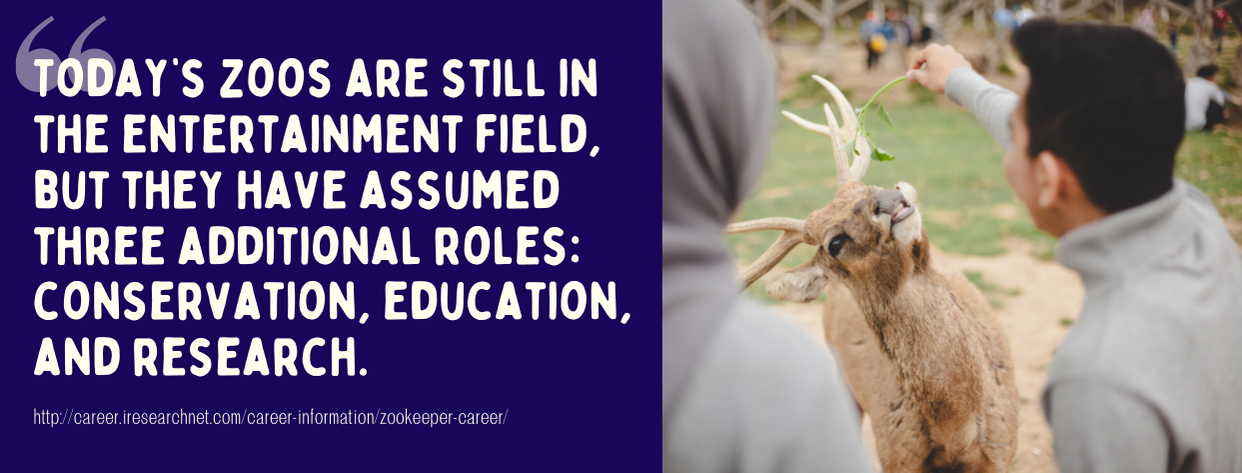
In conclusion, earning a bachelor’s in zoo and aquarium science degree is worth it! You can earn a good living, pursue career advancement and work in a field that you’re passionate about – animals and their care.
Frequently Asked Questions
How much do Animal Care workers get paid?
Animal care and service workers made $29,530 in 2022. Keep in mind that the annual wage varies depending on the geographical location, type of employer, and job position. For example, the highest 10% of animal keepers earned over $44,280 annually!
The industry where an animal caretaker works also affects the median annual wage. According to BLS, those involved in personal services earned the highest with $60,510/year, followed by retail trade workers ($34,730) and social advocacy organizations ($84,838). Animal trainers were the highest-paid animal keepers with a $41,820 median annual salary.
Zoos aren’t the only workplaces for animal keepers. Kennels, stables, pet stores, animal shelters, aquariums, and veterinary clinics are also great places.
Before deciding on an animal keeper career, be sure that you have your eyes wide open! The job’s physical and mental demands include facing distressing situations, lifting objects and animals, and assisting vets in euthanasia. There’s also the risk of injuries and illnesses from being scratched, kicked, and bitten by animals.
But if you’re adamant about becoming an animal keeper, then you must forge on! You will find that the rewards far outweigh the risks of the occupation. These rewards go beyond the good salary, too, including opportunities to make a positive difference in the lives of animals and people.
To be successful as an animal keeper and in other related jobs, you must be compassionate, patient, and detail-oriented. You should also be physically fit, reliable, and quick on your feet. Your customer service and people skills aren’t just for people, too, but for the animals under your care.
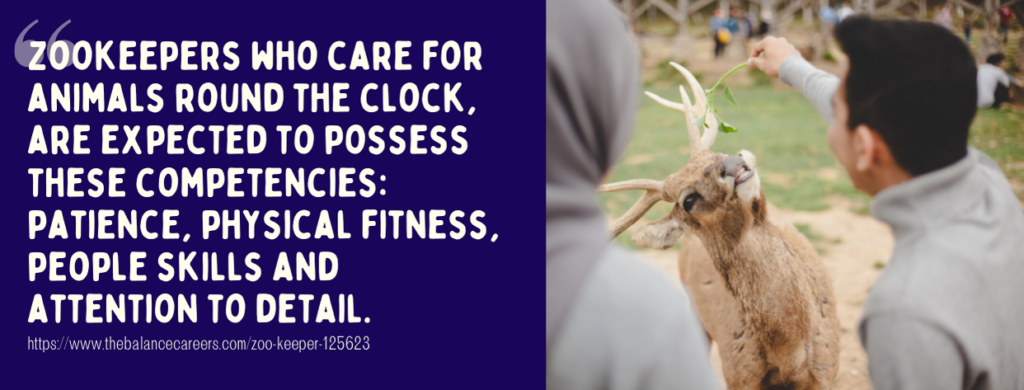
Should you earn a Bachelor’s degree in Zoo Science?
Are you ready to earn a college degree? The differences between zoology, zoo science, and animal science must first be emphasized.
Zoology, a branch of biology, studies the evolution, structure, and behavior of animals. For undergraduate students, the coursework includes animal anatomy and physiology, biological structures and genetics, and environmental policy and practices. The emphasis is on gaining a deeper and broader understanding of animals through research activities in various settings.
Zoo science deals with the actual care of wild animals in captivity, such as in zoos and reserves. The wild animals themselves may be ill or injured, be on the endangered species list, and be exotic animals. Their survival may partly depend on assistance from humans, too, such as in the case of endangered species.
Students in zoo science programs learn about animal behavior, breeding, nutrition and health, and proper handling. In most programs, the study of zoo and aquarium sciences is combined with expanding their skill set. The ability to properly care for both land and water animals is a hallmark of the best zoo science graduates!
With that said, the main difference between zoology and zoo science as an undergraduate program lies in their application. Zoology students focus more on gaining and discovering zoological information via short- and long-term studies. Zoo science students apply zoological information in real-world settings.
Zoo science and animal science are also two different animals, pun not intended. Animal science deals with the science and business of livestock production and the care of companion animals. The livestock animals include but are not limited to swine, cattle and dairy cattle, beef, sheep, poultry, and horses.
Animal science students can then find jobs in kennels, animal clinics, zoos, animal preserves, and horse farms, just like zoo science students. However, zoo science has a more intensive focus on wild animals living in captivity, while animal science emphasizes domesticated animals.
Most zoo and aquarium science degree programs are partnerships between the universities offering them and local zoos, among other animal facilities. In this manner, students learn about proper animal care in both classroom and field settings. The hands-on experience is a must due to the practical nature of future jobs.
Students must also learn about basic research and education techniques in addition to practical skill sets. This is because zoos and aquariums have become venues for human-animal interactions. As such, these places have become living laboratories where staff members work together to collect extensive data. The data collection efforts cover animal behavior, physiology, reproduction, disease, nutrition, and genetics.
As such, the coursework covers animal behavior, genetics, ecology, anatomy, nutrition, and evolution. The knowledge learned doesn’t just come from books but also from direct dealings with zoo and aquarium animals. Students, of course, must be under the direct supervision of their teachers and zoo staff for their hands-on learning.
Many programs are also in partnership with zoos and aquariums accredited by the Association of Zoos & Aquariums (AZA). Their executive staff lectures on a wide range of topics, from zoo ethics and responsibility to zoo animal nutrition. These lectures supplement the classroom lectures by instructors and widen the scope of understanding among students.
Zoo science degree programs have capstone experiences and internship requirements, a common aspect of science-centric degrees. The requirements vary between programs, but a semester-long capstone or internship at a zoo or aquarium is typical, and it can be during the junior or senior year.
Student interns work alongside the staff members of the host facility and interact with visitors whenever necessary. The opportunities to apply classroom learning to real-world settings and learn more about day-to-day operations make the internship enjoyable.
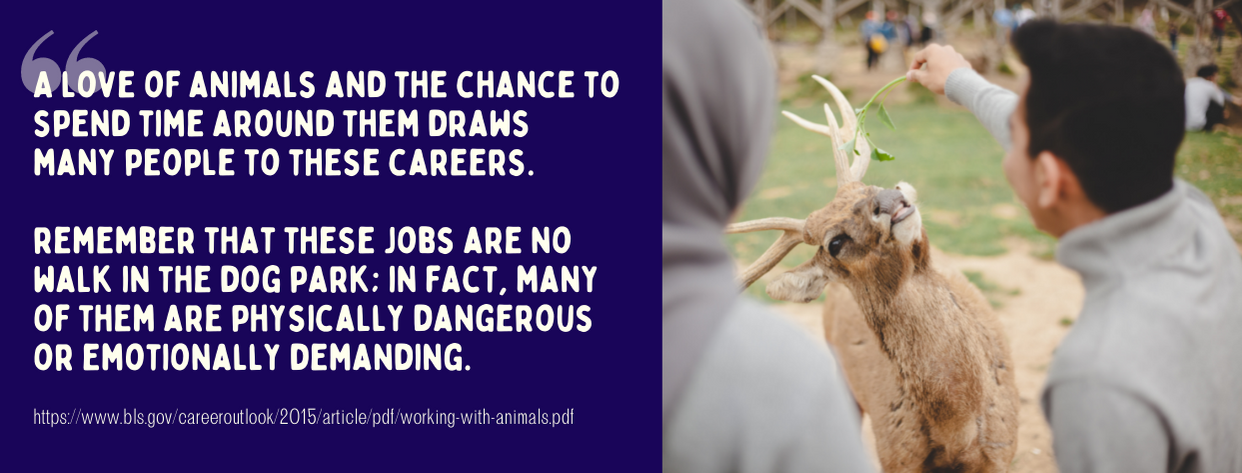
Points to Ponder
Are you ready to become a Zookeeper or Animal Keeper? Earning your bachelor’s degree should be your next step! Check out these points:
- Zoo or Animal Science degrees are required for an entry-level position or for most positions of authority in a local zoo or in wildlife rehabilitation centers.
- With a Bachelor of Zoo Science degree, you will have a plethora of job opportunities to consider. You can concentrate on animal care as a veterinary technician, open an animal shelter, work at your local zoo, in animal hospitals, in wildlife management, work with exotic birds, in veterinary medicine, and much more.
- Do you prefer to work with domestic animals, conservation science, or wildlife management? The sky’s the limit with so many possibilities!
- Wildlife conservation is imperative to preserve our wild animals, a necessary part of our ecosystem. Become an Animal Keeper today!
Check these out too:
